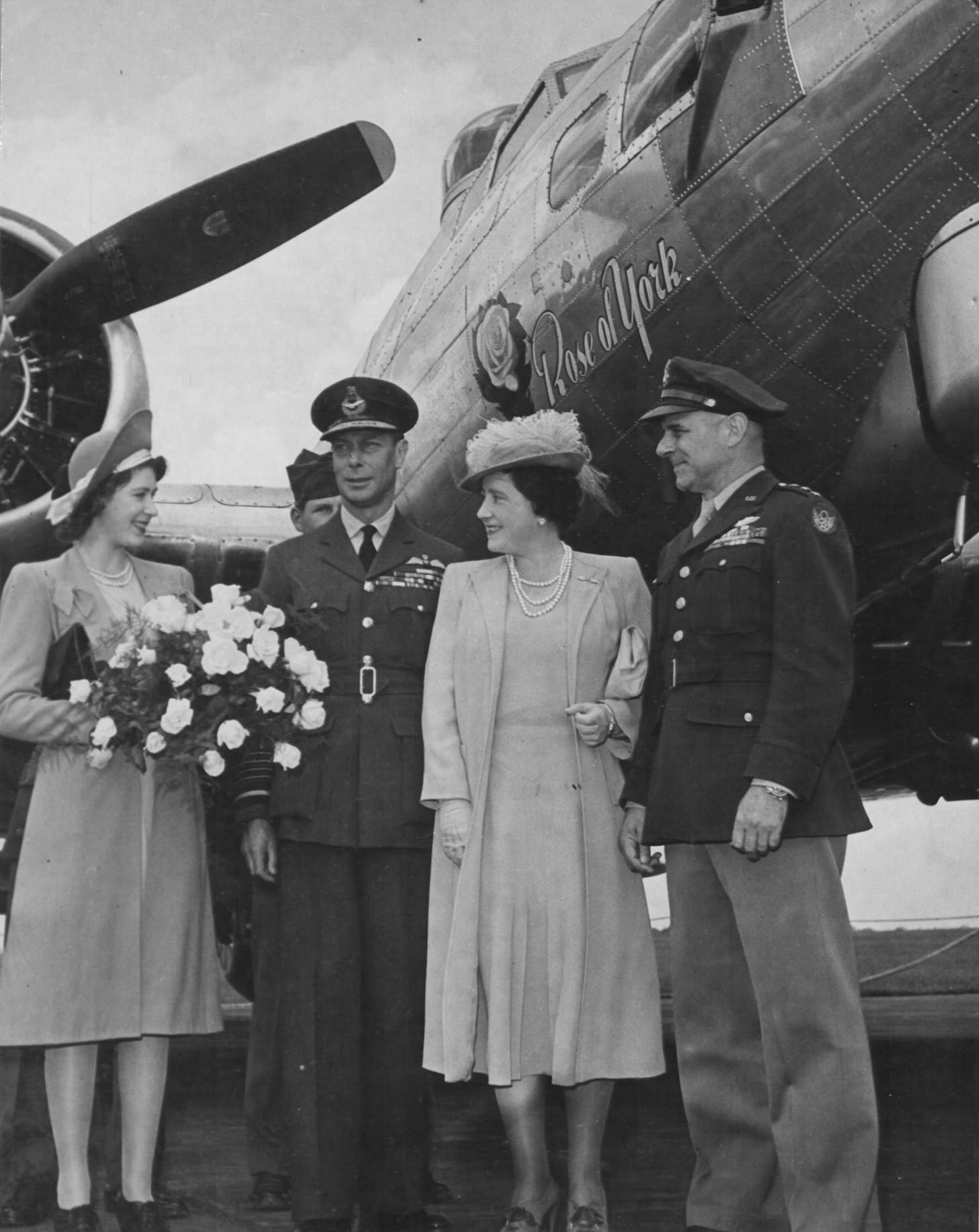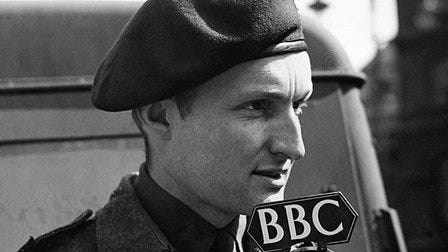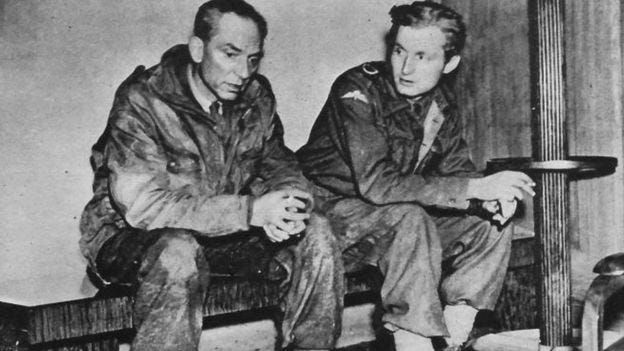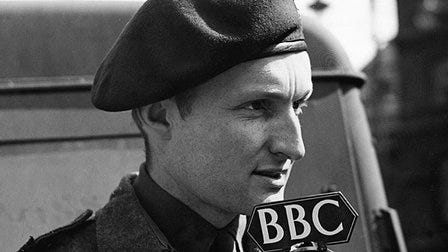Guy Byam sought danger until the end
Guy Byam spent less than a year as a BBC war correspondent, but few can match his legacy of reporting from the midst of the action.
That inclination toward the front lines was what helped land him a job in the first place. Early in World War II, Sub-Lieutenant Guy Byam-Corstiaens was a member of the Royal Navy Volunteer Reserve, serving aboard the HMS Jervis Bay.
On Nov. 5, 1940, Jervis Bay was escorting a convoy from Bermuda to Great Britain when the group came under attack by German ship Admiral Scheer in the North Atlantic. Jervis Bay tried to hold the line as the convoy scattered, but ultimately went down with many of its crew. Byam-Corstiaens was one of 68 survivors out of the 254 aboard.
That was the end of his military service, though, as an explosion during the attack damaged his eyesight. Back home in Britain, Byam-Corstiaens — who was fluent in French and favored a beret — joined the BBC as an editor and dropped the latter part of his last name. He eventually worked his way up to a coveted spot as a war correspondent and participated in the two major airborne operations of 1944.
Early on June 6, Byam dropped into Normandy with paratroopers from the British 6th Airborne. His account of the experience would air on the BBC and run in newspapers a few days later. The Guardian printed this dispatch on June 9:
We are over the coast, and the machine starts to rock and jump from the flak. The run-in has started — one minute, thirty seconds, red light, green light, and out.
The ground comes up to hit me, and I find myself in the middle of a cornfield. I look around and even with a compass I cannot be sure where I am. Overhead hundreds of parachutes and containers are coming down. The whole sky is a fantastic chimera of lights and flak. One plane gets hit and disintegrates wholesale, sprinknling a myriad burning pieces all over the sky. …
Soon it is light, and while the cannonade begins on the beaches our paratroop unit fights a terrific battle over the bridges, actually repelling an attack by a Panzer formation. These air-borne units fight magnificently and with terrific moral and valour.
The people are pleased to see us. We apologise for bringing the war to their homes, but in little ways they show they are glad to see us. A dead paratrooper is laid out on a bed in the best bedroom, covered from head to foot with flowers.
Exactly a month from his D-Day descent, Byam spent the day on a far less challenging assignment. He was at Thurleigh Airfield in Bedford, north of London, to cover the christening ceremony of a new U.S. Eighth Air Force B-17.
This wasn’t the sort of thing that generally would require news coverage, but the Rose of York wasn’t an ordinary bomber. It was named in honor of 18-year-old Princess (now Queen) Elizabeth, and she was on hand for the ceremony along with her father, King George VI, the former Duke of York.

By mid-September, Byam was back to more harrowing pursuits, parachuting into the Netherlands during Operation Market Garden.
He and BBC colleague Stanley Maxted reported from the increasingly dire situation near Arnhem before joining the troops in the eventual order to pull out.
On Sept. 27, Byam broadcast this account of the withdrawal on the BBC’s War Report:
They came out because they had got nothing left to fight with except their bare hands, maybe. All day, as for six days before that, the tanks and the mortars and the flame-throwers had smashed at the positions. For some time the men had been fighting without food, and practically with no water, fighting an enemy whose growing strength was almost in our midst, fighting with small arms against armour.
Every brick, every wall, every house was a part of the battle that ebbed to and fro, a yard here and a yard there. And those men who climbed out of their foxholes and slit trenches weren’t beaten, mind you; no, they had to get out because of events the other side of the river. No, the German soldier never really beat them; their tanks could come in and they could shell us from a distance, hour after hour of it, but when the SS troops were sent in against our men they got murdered, and they hated every minute of it.
A little over a week later, the Surrey Advertiser ran a short story on Byam, a local resident, and his experiences at Arnhem. It concluded:
“It is good news that he was none the worse for the strangest and perhaps most dangerous experience known to a war correspondent.”
On Feb. 3, 1945, Byam returned to a familiar site, Thurleigh Airfield, and climbed aboard a familiar aircraft, the 367th Bombardment Squadron’s Rose of York, to accompany the crew on a raid of Berlin.
The B-17 had been a workhorse in the months since that high-profile christening ceremony, completing 62 missions over Berlin, Cologne, Stuttgart and other targets.
At the controls for mission 63 was 1st Lt. Vernor F. Daley Jr. (not “Vernon,” as most newspapers wrote), who had celebrated his 26th birthday four days earlier. That day, his nine-man crew was a miniscule cog in a massive armada, more than 1,000 bombers striking at the heart of the Reich.
There was no fighter cover over the capital that day, but “intense, accurate, tracking flak” began about four minutes before Rose of York and nearby planes released their bombs. They flew through that barrage, which continued after they cleared the target, and at some point in the onslaught Rose of York was hit.
Daley nursed the wounded bomber toward home, reporting over the radio at one point that he had lost one engine to anti-aircraft fire and was leaking gasoline. Rose of York fell farther and farther behind the main formation and never made it back to England.
There are conflicting reports about where the plane was when the final contact occurred. The Army Air Forces would tell the press it was near the Frisian Islands in the North Sea, while the official missing air crew report says it was over the English Channel.
A search-and-rescue mission was mounted the following day, British newspapers reported at the time, “but no trace of the missing men was found.”
Depending on which source is consulted, Byam was either 26 or 27 years old.






